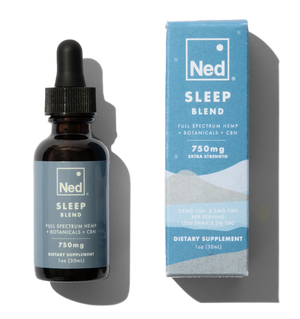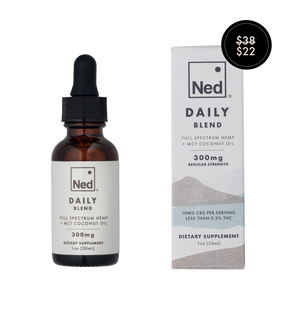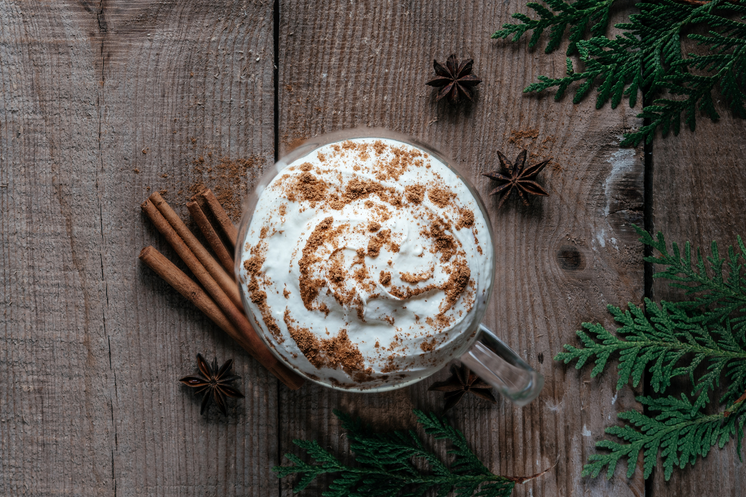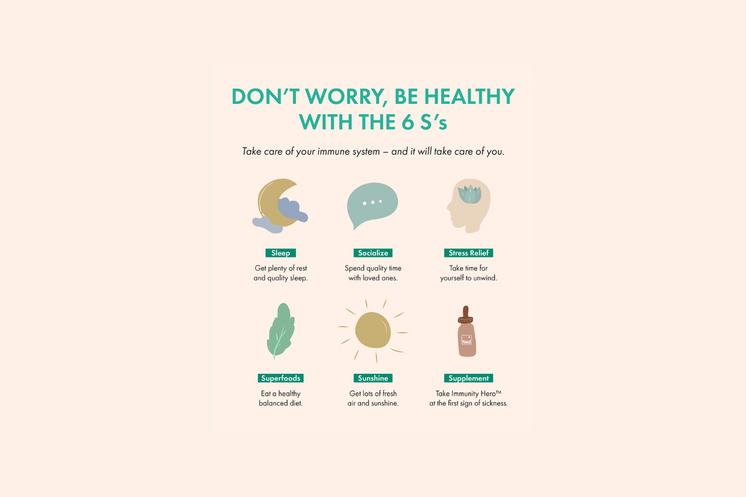BEAT THE WINTER BLUES
From red light therapy to vitamin D, find out what we're doing to feel our best this season!
Natural Remedies for Winter
As the nights get longer and the days get shorter our bodies are meant to slow down, rest and repair. Though with the holiday season upon us, many of us may push ourselves more than we should. When circadian rhythms get disrupted along with less exposure to sunlight, Seasonal Affective Disorder (SAD) can kick in and trigger depressive episodes (1). Holistic health tips and herbal remedies can help balance out these winter blues and uplift our mood. Take some time to slow down, allow yourself to rest and enjoy the changing seasons. Keep scrolling for some of our favorite winter tips to uplift your mood.
Sleep Blend
Sleep deeper, longer and wake up refreshed with Sleep Blend — the natural path to deeper sleep. This organically made tincture tincture blends CBN — a powerful cannabinoid that promotes sleep, full spectrum hemp from the purest single source hemp flower extract and organic botanicals used in traditional medicine.
60-day Stress Free Guarantee
Simply place your order. Your 60-day trial begins from the day your order is delivered.
Start using your Ned product. Our Customer Happiness Team is here to give you all the guidance you need.
If you want to break things off, no hard feelings. Contact our Customer Happiness Team and they’ll help you out. Simple.
**Valid for one product at a time - bundles not eligible
Red Light Therapy
Photobiomodulation (2) has so many emerging health benefits, from reducing wrinkles to muscle repair and assisting in mental health. The wavelengths can penetrate below the skin's surface, into the mitochondria, and have a direct effect on our cells. This can boost the metabolism, decrease overall inflammation, and balances the body's circadian rhythm! Our favorite free nature hack for getting Red Light Therapy – go outside and watch the sunrise and sunset each day!
Vitamin D
Studies show people with lower Vitamin D (3) levels are more susceptible to Seasonal Affective Disorder. This is not only a vitamin, but also a hormone our body makes, and with low levels everything can be thrown out of balance. It can be hard to boost this up in the winter season, but diet and supplementation can be a great resource to lean on!
- Add foods like salmon, cod, eggs, mushrooms into your diet.
- Taking a D3/K2 supplement assists in better absorption!
- Did you know Magnesium helps your body metabolize Vitamin D? Incorporate our bestselling mellö Magnesium Superblend with your daily Vitamin D.
mellö Magnesium
30 serving pouch
Magnesium plays a role in over 300 essential functions in the body, including helping to maintain healthy energy levels, muscle function, and a balanced mood. mellö Magnesium Superblend® is a thoughtfully crafted formula made to support your daily wellness routine.
60-day Stress Free Guarantee
Simply place your order. Your 60-day trial begins from the day your order is delivered.
Start using your Ned product. Our Customer Happiness Team is here to give you all the guidance you need.
If you want to break things off, no hard feelings. Contact our Customer Happiness Team and they’ll help you out. Simple.
**Valid for one product at a time - bundles not eligible
Optimize Nutritious Foods
Getting your micro and macro nutrients in a balanced diet can uplift your mood and lower overall inflammation!
Whole Grains
Steel cut oats, bulgur wheat, and brown rice, can balance your blood sugar and lower your blood glucose levels (4), making you feel fuller longer, and elevate your mood.
Omega 3’s
Fatty fish, flax seeds, hemp seeds, olives and nuts are whole food sources to not only help your heart but also help prevent neurologic issues like anxiety and depression (5)!
Probiotics
Fermented foods or a probiotic supplement can balance your microbiome, lower inflammation, and restore the gut-brain axis in our bodies. Having biodiverse gut health has shown to lower depression symptoms (6).
Daily Blend
30mL (1oz)
Simplify your daily ritual with Daily Blend, a single all-natural primer for better health and wellness. Slow crafted from the world’s purest USDA certified organic hemp, Daily Blend helps you build your health on a strong foundation by bringing your body back into balance (think of it as restoring your body to its optimal factory settings!) and providing functional support for sleep, stress, and pain + inflammation.
60-day Stress Free Guarantee
Simply place your order. Your 60-day trial begins from the day your order is delivered.
Start using your Ned product. Our Customer Happiness Team is here to give you all the guidance you need.
If you want to break things off, no hard feelings. Contact our Customer Happiness Team and they’ll help you out. Simple.
**Valid for one product at a time - bundles not eligible
Herbal Support
Mother Earth has provided all the calming, relaxing plants we need to support us during this transitional season.
Hemp (Cannabis sativa)
The hemp plant has been used for centuries in medicinal ways. It is wonderful in assisting in pain, inflammation, the endocrine system, and gastrointestinal issues. Having deficient endocannabinoid levels can lead to neurological symptoms such as anxiety and depression. Hemp has been shown to modulate the endocannabinoid system and protect neurotransmitters (7). You can find USDA certified organic full spectrum hemp in our original Daily Blend.
Cacao (Theobroma cacao)
Cacao is referred to as the “food of the gods” as it has a powerful ability to lift our spirits. It is full of a wide range of phytochemicals to nourish not just the body but elevate your mind. It contains high amounts of magnesium, can help lower blood pressure, and increase circulation. Try making our famous Vanilla Shuteye Chai Hot Cacao recipe!
Ashwagandha (Withania somnifera)
This immunomodulating adaptogen is the perfect friend for winter. It is helpful in assisting the endocrine system, protecting the heart, releasing tension, and assisting with circulation. The moistening properties of this herb can help combat dry conditions in winter and it contains antioxidants to help protect the immune system. You can get your daily serving of ashwagandha in our bestselling De-Stress Blend.
Reishi (Ganoderma lucidum)
Known as the “mushroom of immortality”, this medicinal mushroom assists with the majority of the systems in the body. It is an adaptogen and a powerful plant to resist stress. As an immunomodulator, which means it can help balance an over or underactive immune system, while fighting off and helping to prevent infections. With a high antioxidant content along with powerful polysaccharides, these phytochemicals work best when consumed regularly. You can find certified organic reishi in our Shuteye Chai mellö sleep Latte.
Oatstraw (Avena sativa)
This moistening and sweet herb is a natural nervine. It is calming and relaxing to the mind and can help bring balance to your nervous system. It is rich in B vitamins and can be the perfect ally in the dry winter months. You can find certified organic oatstraw in our Balance Blend.
Lemon Balm (Melissa officinalis)
For gentle nervous system support, lemon balm is a safe and reliable herb to lean on. Its mildly sedative properties assist with neurological issues such as anxiety and insomnia, while at the same time, its exhilarating properties can work against SAD. You can find certified organic lemon balm in our bestselling Sleep Blend.
Comfrey (Symphytum officinale)
An herb used for winter remedies, comfrey is a powerful wound healer. It contains allantoin, which helps reproduce new skin cells when used topically. It has an affinity to the respiratory system and can bring relief when applied topically to the chest. You can find comfrey in our Relief Balm.
- Melrose S. (2015). Seasonal Affective Disorder: An Overview of Assessment and Treatment Approaches. Depression research and treatment, 2015, 178564. https://doi.org/10.1155/2015/178564
- Nussbaumer, B., Kaminski-Hartenthaler, A., Forneris, C. A., Morgan, L. C., Sonis, J. H., Gaynes, B. N., Greenblatt, A., Wipplinger, J., Lux, L. J., Winkler, D., Van Noord, M. G., Hofmann, J., & Gartlehner, G. (2015). Light therapy for preventing seasonal affective disorder. The Cochrane database of systematic reviews, (11), CD011269. https://doi.org/10.1002/14651858.CD011269.pub2
- Melrose S. (2015). Seasonal Affective Disorder: An Overview of Assessment and Treatment Approaches. Depression research and treatment, 2015, 178564. https://doi.org/10.1155/2015/178564
- Li, S., Zong, A., An, R., Wang, H., Liu, L., Liu, J., Guo, X., Xu, Z., Wang, J., Li, D., Du, F., & Xu, T. (2023). Effects of whole grain intake on glycemic traits: A systematic review and meta-analysis of randomized controlled trials. Critical reviews in food science and nutrition, 63(20), 4351–4370. https://doi.org/10.1080/10408398.2021.2001429
- Larrieu, T., & Layé, S. (2018). Food for Mood: Relevance of Nutritional Omega-3 Fatty Acids for Depression and Anxiety. Frontiers in physiology, 9, 1047. https://doi.org/10.3389/fphys.2018.01047
- Huang, R., Wang, K., & Hu, J. (2016). Effect of Probiotics on Depression: A Systematic Review and Meta-Analysis of Randomized Controlled Trials. Nutrients, 8(8), 483. https://doi.org/10.3390/nu8080483
- Huang, W. J., Chen, W. W., & Zhang, X. (2016). Endocannabinoid system: Role in depression, reward and pain control (Review). Molecular medicine reports, 14(4), 2899–2903. https://doi.org/10.3892/mmr.2016.5585











